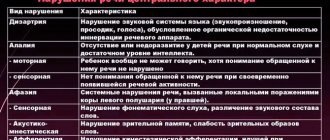A referral to a commission to register a child in a speech therapy group causes protest and anxiety among parents. Many parents feel that the goal of the commission members is to make a diagnosis and issue a certificate, but they are not interested in the needs of the baby.
In addition, hearing about a correction group in a preschool educational institution (preschool educational institution), parents have the feeling that their beloved child is mistaken for a mentally retarded person. And they, having rejected the voice of reason, strive to prove the opposite to everyone. Although the conclusion of a speech therapist is the first step towards eliminating the defect. After all, the earlier a violation is detected, the easier it is to deal with it.
What is a speech therapy group and who needs it?
The correctional group in kindergarten is designed to create optimal conditions for children with severe speech impairments to eliminate the defect, master the program for preschoolers and prepare for literacy (reading and writing) at school.
In the speech therapy group, educators and defectologists work on establishing correct articulation, improving the perception and recognition of phonemes by ear, increasing passive vocabulary, developing coherent oral speech, and eradicating grammatical errors. Additionally, classes are conducted that develop fine motor skills of the fingers, the ability to draw, strengthen memory, promote concentration, and the development of imaginative and spatial thinking. This comprehensive approach allows you to quickly eliminate speech underdevelopment.
Corrective work is carried out jointly by a speech therapist, a teacher, a physical teacher and a kindergarten music worker.
Let's go to the speech therapist. First consultation
What questions can a speech therapist ask parents? What does a speech therapist examine?
Approximate structure of examination of a child from 2 to 11 years old and speech therapy report.
Below you can DOWNLOAD:
- Sample of writing a speech therapy report.
- Sample referral to a neurologist.
Personal data
- FULL NAME. child.
- Date of birth, age.
- Home address.
- Home phone.
- Educational institution (kindergarten/school).
- Curriculum, what program the child is studying in.
- Whether the program was duplicated or not, what grade (for a schoolchild).
- Information about parents: mother (full name, required age at the time of birth), father (full name, age, heredity).
- National language.
- Bilingualism
General anamnesis
- Unfavorable development factors.
- How did pregnancy and childbirth proceed?
- Heredity (are there any hereditary diseases).
- Past illnesses: before/after one year.
- Bruises, head injuries.
- Convulsions, whether there are convulsions at high temperatures.
Early development
- Holds his head with... (norm from 1.5 months).
- Sits from….. (normal from 6 months).
- Crawling from ..... (normal from 6-7 months).
- Costs from…..(normally from 10-11 months).
- Walks from .....(normally from 11-12 months).
- Recognizes loved ones from ....(normally from 2.5 - 3 months).
- The first teeth appeared from... (normally at 6-8 months).
- Number of teeth per year….(normally 8 teeth).
Speech anamnesis
- Walking in... (normal from 2 months).
- Babbling in .... (normal from 4-6 months).
- The first words...(normal for about a year).
- The first phrases in….(Normally from 1.5 to 2 years).
- Was speech development interrupted and for what reason?
- Use of gestures (replacement of speech, addition of speech).
- Attitude of family members to the child’s speech defect.
- Have you worked with a speech therapist?
- For how long?
- Results of sessions with a speech therapist.
Examination of the articulatory apparatus
- Lips.
- Teeth.
- Bite.
- Jaws.
- Sky.
- Language.
- Bridle.
- Uvulus.
Mobility survey
- Lips.
- Language.
Fine Motor Skills Test
- On the switching bridge
- On hold.
Hearing test
With normal hearing, the child should hear and repeat words and phrases spoken in a whisper in the residual air (after exhalation) at a distance of 6-7 meters from the auricle. When testing hearing, visual perception of speech should be excluded. The boundaries of perception of whispered speech are determined. The perception of a whisper at a distance of less than 3 meters indicates the need for special consultation at a hearing aid center to clarify the state of hearing.
Sound pronunciation survey
- Vowel sounds.
- Consonant sounds.
- Whistling, hissing, affricates.
- Sonorous.
- Voiced and voiceless.
- Fricatives.
Examination of the syllable structure of a word
- The words are polysyllabic.
- With a consonant cluster.
- Contain similar sounds.
Phonemic Awareness Test
- A chain of syllables.
- A chain of words.
- Differentiation of oppositional phonemes.
Vocabulary Survey
- Subject dictionary.
- Verb dictionary.
- Selection of synonyms.
- Selection of antonyms.
- Selection of related cognate words.
Examination of the grammatical structure of speech
- State of sentences or short stories.
- Using prepositions.
- The use of nouns in different cases.
- The use of cases depending on the numerals.
- Forming the plural from a singular noun and vice versa.
- Formation of the genitive plural form.
- The use of number in agreement with a noun.
- Formation of the diminutive form of a noun.
- Use of suffixes.
- Formation of adjectives from nouns.
- The use of prefixes in verbs.
Study of the sound composition of a word (from 5 years old)
- Highlighting the vowel at the beginning of the word and under stress.
- Isolating vowels in monosyllabic words.
- Highlighting the vowel at the end of a word.
- Isolating a consonant from the beginning of a word and a vowel from the end of a word.
- Independent selection of words starting with a given sound.
- Determining the place of a sound in a word.
- Definition of syllables in a word.
- Determining the number and sequence of sounds and letters.
- Definition of vowels and consonants.
- Designation of consonant letters by sound: voiced or voiceless, soft or hard.
Writing examination (from 7 years old)
- Copy words and sentences from handwritten text
- Copy words and sentences from printed text
- Write down lowercase and uppercase letters from dictation
- Syllable dictation.
- Dictation of words of different structures.
- Suggestions after listening once.
- Auditory dictation.
Reading survey (from 7 years old)
- Select vowels and consonants.
- Reading syllables.
- Reading words.
- Reading phrases.
- Reading specially selected texts.
It is important to promptly determine the presence/absence of speech disorders and take all measures to overcome them. A complete diagnosis of your child and consultation with determination of the further course of action can only be obtained at a face-to-face meeting with a specialist. No amount of online correspondence, chats on forums, or communities can provide complete information about the problem and qualified assistance to you and your child.
Olga Sakharovskaya
PMPC - what is it?
The commission for the speech therapy group is called PMPC and stands for psychological-medical-pedagogical. Children 4–5 years old with severe speech disorders are referred to PMPK.
The purpose of the commission is a comprehensive examination of the small patient, identification of speech disorders, recommendation of the necessary training program and duration of correction.
The PMPC includes:
- pediatrician (children's general practitioner);
- clinical psychologist;
- psychiatrist or psychoneurologist;
- speech pathologist or speech therapist.
The teacher or head of the preschool educational institution can recommend taking the commission. Parents can also initiate an examination on their own, believing that the child needs the help of a speech therapist.
Who makes recommendations?
Most often, recommendations to undergo a speech therapy commission are given either by a doctor from the kindergarten where the child goes, or by a specialist from the speech kindergarten when the local one is absent. Children who have speech impairments and need correction are put on a list, which is then introduced to their parents. If they agree to be transferred to a special speech therapy group, then they should appear for an interview. There a two-sided form is given, that is, a referral for a preliminary medical examination before the commission. No one will force parents to go to doctors; such a decision is purely voluntary.
How to get on the commission?
The first thing that is necessary is to take a referral for a PMPK examination in kindergarten, from a speech therapist or pediatrician. Then you need to prepare the necessary package of documents. It includes the conclusion:
- ophthalmologist;
- otolaryngologist;
- pediatrician or family doctor;
- psychiatrist or neurologist.
From the preschool educational institution that the child attends, you need to take a reference from the teacher and speech therapist, certified by the signature of the head and a wet seal.
Then the date of the commission is specified. Registration for examination is carried out at the city center for psychological, medical and pedagogical support. When undergoing the examination, parents provide passports, the baby’s birth certificate and a prepared package of documents.
Composition of the commission
The speech therapy commission consists of the following members:
- the chairman is a specialist in the educational field;
- deputy – healthcare specialist;
- doctors of one or another specialization (ophthalmologist, orthopedist, pediatrician, otolaryngologist, etc.);
- psychologist;
- special teacher (oligophrenopedagogist, teacher of the deaf, speech therapist, defectologist, etc.);
- lawyer;
- social teacher, social worker.
To prevent the child from being frightened by unfamiliar surroundings and people, the commission may include temporary members - his class teacher, teacher, etc. Children are sent to PMPK only when their parents give consent.
What happens at the commission?
Parents come to the examination with their baby. The PMPK meets collegially in one room. A speech pathologist, clinical psychologist, teacher, psychiatrist or neurologist talks with the baby in the presence of adults.
The listed doctors are located at the same table, communicating with the child standing opposite them. Or they are at different tables, and the baby takes turns approaching each person present. During the examination you will have to answer questions and complete tasks.
The atmosphere of the commission can frighten the child. Specialists do not try to find an approach to the baby; they ask questions hastily, without giving time to think.
The duration of the examination is from one to two hours. It is important that parents reassure the child and are able to protect against an overly harsh tone or an incorrect diagnosis. It is worth bringing food and water for your baby.
How to prepare?
Before the examination, you need to explain to the child what is required of him, explain in what form the conversation will take place. You can ask your child the questions that will be discussed at the commission in a calm home environment. They depend on the age of the baby and the preliminary diagnosis.
At the commission, experts ask:
- Tell about yourself and your family: name, age, place of residence, occupation of parents. Describe what the baby prefers to play with friends, what to do with mom and dad. Name the teachers and nannies. Tell us about your pets: what’s their name, what they eat, how they play. Describe your house: number of rooms, purpose of the kitchen, toilet, bathroom.
- Tell him what he knows about the concepts of day and night, weekdays and holidays, describe his daily routine.
- Name the colors and shapes of the objects shown in the pictures, their location (under the table, on a chair, above the window).
- Sort the pictures into groups: food, pets, furniture, toys. Find an extra item in the row and explain why.
- Name the parts of the body and their purpose.
- Remember a series of objects, turn around and find what has changed.
- Repeat the words spoken by the specialist in the same order.
They check the articulation and literacy of sentence construction in accordance with age standards. The child should know what synonyms are (fun - joy), antonyms (crying - laughter), homonyms (key, braid), give examples.
Then phonemic awareness is checked. To do this, the child names the syllables of a given word and counts the words in the spoken sentence. They check whether the baby perceives the meaning of words that are similar in articulation: bark - hole.
The level of coherent speech is analyzed by asking a small patient to compose a story based on a picture.
The perception of someone else's speech is assessed by giving the task to retell a short story. The baby should:
- demonstrate how he sings, jumps, eats;
- express your needs and feelings: tired, hungry, wants to sleep;
- catching or hitting a ball, jumping on one leg is an indicator of coordination of movements.
The tasks and questions asked by PMPC members are not difficult. It is important to understand the reason why the child could not complete them. This could be banal excitement, pedagogical neglect, poor understanding of the Russian language (if it is not the child’s native language) or underdevelopment of speech that requires correction.
It is necessary to test the child in advance so that he does not worry when he hears a question or task, and understands what awaits him. However, the diagnostic questions of PMPK are standard and any child of a certain age can cope with them.
How much does an appointment cost?
The cost of an appointment depends on the qualifications of the chosen specialist; in Moscow it starts from 1000 rubles for an initial appointment; in the regions, prices are slightly lower.
In children's clinics at the child's place of residence, if indicated, admission and subsequent classes are provided free of charge.
The frequency of classes is selected individually, taking into account the identified violations. Clinics often conduct group classes, selecting children with similar problems. Groups are formed taking into account the age and development of the child.







